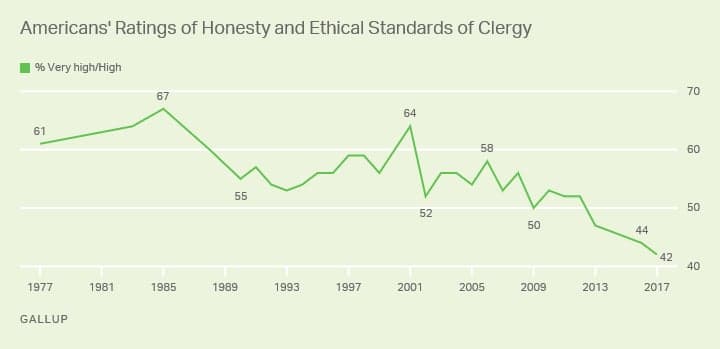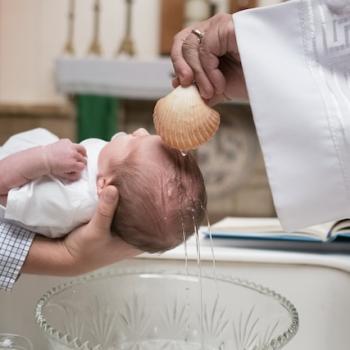 According to a recent Gallup poll, Clergy credibility is at an all-time low.
According to a recent Gallup poll, Clergy credibility is at an all-time low.
There can be little doubt, as the report suggests, that the sex abuse scandal in the Roman Catholic Church did a good deal to set that trend in motion, beginning in 2002. But after recovering slightly in the years that followed, the numbers have continued to decline.
Gallup says little more about the trend than that, and it is difficult to be adamant about the causes. But it is definitely worth pondering and here are some thoughts.
One: For sometime now, sociologists have argued that “moral, therapeutic deism” has become the default mindset of an increasingly larger number of Americans. That trend could be accelerating and clergy credibility could be dropping, right along with it. In a culture that values therapy over theological explanations for who we are and what we need, by definition, clergy will not fare as well.
Two: Similarly, in a world that increasingly identifies itself as spiritual, but not religious, clergy will increasingly be treated as representatives of an institution without a meaningful connection with people’s lives.
Three: The trend may also echo a decline in church attendance. It is interesting that the top professions are regular fixtures of community life: Nurses, military officers, grade school teachers, medical doctors, pharmacists, police officers, day care providers and judges all appear ahead of clergy in the most recent list. Without a regular and identifiable role in the community, clergy will no doubt be treated with a good deal more suspicion.
So, what are clergy to do? If my reading of the problem is accurate, here are four suggestions:
One, be forthright about the theological and spiritual nature of human life and need. If the culture is sold out to moral therapeutic deism, in part it is because people in the pews have heard it in our churches. All too often a combination of therapy and politics has become the staple of American pulpits. Most pastors have no training in political science or psychology and those who major in politics tie their credibility to politicians (who live at the bottom of the credibility scale). Even when people look to their faith for making decisions as voters, they look to their pastors for a different kind of guidance; and clergy who talk as if they are experts in other disciplines compromise their credibility from the get-go.
Two, connect the religious and spiritual dots. Properly understood, Christian spirituality is grounded in the church’s sacraments and worship. But the connection between the three is rarely made.
Three, get involved in the life of the community. The presence and participation in a church’s community once developed without effort. Now churches and their clergy live in greater isolation from the communities in which they are located. It is difficult to trust a stranger.
Finally, character continues to count. The message cannot be separated from the messenger. The spiritual, moral and theological integration that nurtures credibility cannot be pedaled like a product. It must be cultivated as a way of being.
If we do these things, the numbers will take care of themselves.












